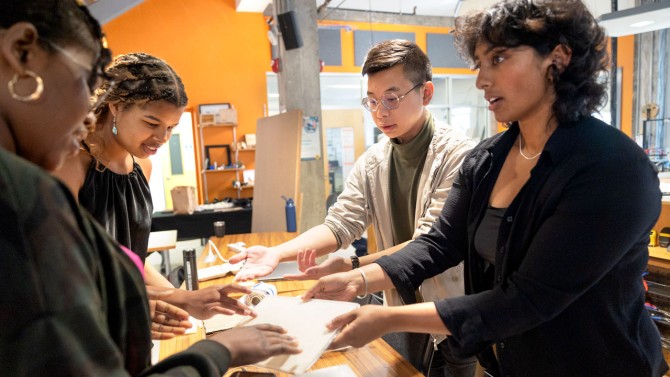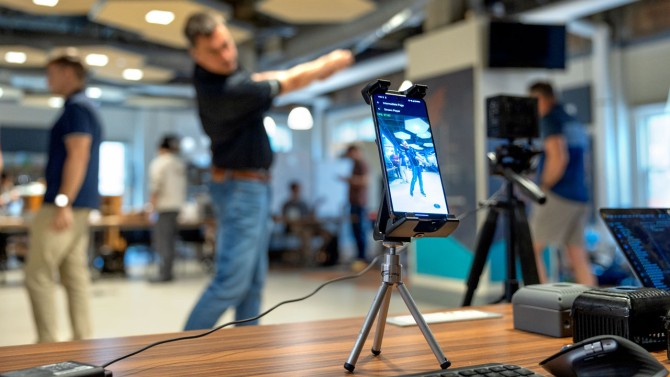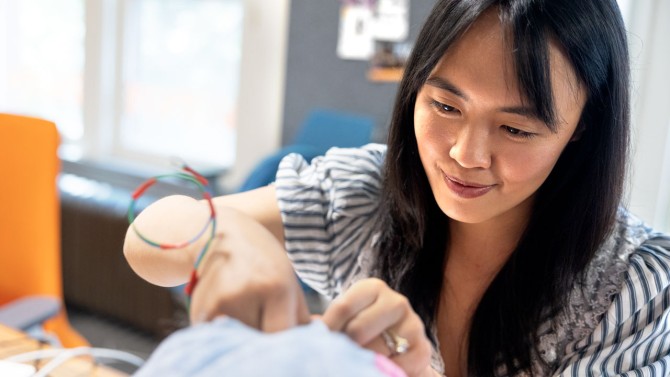Inventing a new product that you can hold in your hands and bring successfully to an eagerly awaiting market is sometimes likened to childbirth: If we knew from the outset how hard it was going to be, fewer of us would do it.
Over 10 weeks this summer, Rev's Prototyping Hardware Accelerator guided product teams from back-of-the-napkin ideas to fully-fledged startups. In categories from climate technology to agricultural innovations, and with projects that range from canoe racing tools to improved tea dispensers, teams gained access to experts in their industry's field, working together to figure out if their concept might be commercially desirable, technologically feasible and economically viable.
Members of the EquiPad team Bryan Wong, center right, and Sanjana Gurram, right, discuss their prototype with fellow entrepreneurs.
The program culminates in a free public Hardware Demo Day Aug. 1, where each team has the chance to demonstrate its progress and pitch its product to community members as well as potential investors and partners. Tickets can be reserved here.
This year's 22 teams are the most diverse yet, said Ken Rother, director of Rev: Ithaca Startup Works, with about half students and half professionals, and with a significant number of female founders and many participants with only a tangential connection to Cornell.
"I stumbled across Rev on LinkedIn," said AnalytiTech co-founder Christopher Cilip, who grew up in Corning, New York, and has worked in deep-learning camera systems. For Bryan Wong, Pooja Patel and Sanjana Gurram, the team behind EquiPad, a sustainably designed disposable menstrual pad alternative, their connection was forged in a University of California, Berkeley course on taking plastics out of the supply chain.
But what unifies this year's teams is a deep desire to fix a problem, right a wrong or make elegant solutions equitably accessible. It's personal.
"For Christmas, I was spending time trying to find Cantonese-speaking toys for the children in my family," said Annie Hua, founder of Babel Blocks, an interactive stuffed animal toy that allow parents to customize language settings. "I'm not a parent, but I've talked to parents raising bilingual or multilingual kids, and they say it's hard to find toys in their languages."
Each startup in the accelerator has been paired with an experienced entrepreneur and has access to a team of hardware engineers to assist with developing physical products. For Hua, this meant thinking through what kind of toy would be a beloved "keeper."
"The toy industry creates a lot of waste, and plastic toys are not held onto as long. A stuffed animal is something with the potential to last longer than a plastic toy, and what I've created is washable and may be customizable," said Hua, who is a graduate of the University of Nebraska and who connected with Cornell and Rev via a women and entrepreneurship program while working at Bank of America.
AnalytiTech founders Christopher Cilip, Tony Kariuki '25, and Sasha Logunov '25 are creating a deep learning camera system for run-time inferencing application.
With the aim of developing a toy that can speak 15 languages, which parents change via an app, Hua said that equity is another driver in her mission.
"A common complaint with lower income families is they just don't have the time to read to their kids. They might have tried to teach their native language to their children but fell off due to time constraints," Hua said.
For the team behind EquiPad, an eight-month journey began with a similar question of how best to make an impact on people at every income level.
"We decided that we don't need to boil the ocean to make an impact," Sanjana Gurram said of their idea: a roll-format dispenser for period pads that can be made of cellulose from any plant waste. Their aim is to debut dispensers for the product in American schools, universities and workplaces, but creating pads that are more affordable, accessible and discreet has significant applications in developing countries where girls and women may miss school or work because of lack of access to menstrual aids.
Deanna Kocher, associate director of Rev's hardware programs and a visiting lecturer at the Sibley School of Mechanical and Aerospace Engineering, says this year's cohort has been especially collaborative, adopting a "rising tide lifts all boats" strategy by balancing strengths and lending input and support where needed.
"Many teams are taking a very focused and streamlined approach to their development," she said. "They're making sure they focus on the most critical items first and making adjustments and pivots accordingly."
AnalytiTech founder Cilip and his teammates Tony Kariuki '25, and Sasha Logunov '25 aim to harness AI to give athletes real-time feedback on learned and refinable motions like golf or batting swings using a computer vision program that monitors joint positions. The low-cost technology has applications for coaching and performance improvement in golf schools or other sports academies, but long term there are myriad possibilities, said Cilip.
"There are applications for physical therapy and sports rehab, where you want people to go from 30 degrees of motion to 90 degrees," Cilip said. "It would be a good tool for remote medicine because it's inexpensive to utilize. And with pose detection, it's applicable for animals and veterinary analysis. The opportunities are boundless."
Some of this year's accelerator teams aim to solve a single small problem with huge implications. For the High Tunnel Titans, anchored by Joanna Tan, a rising junior in mechanical engineering at Cornell, a regional farming problem is under the microscope. Rolling high tunnels - hoops that function like portable greenhouses that can be moved to shield plants from rain, sun or cold, or to give soil a break at growing season's end - are costly, unwieldy, or both. What if they were made lighter and more flexible, bending with the wind like a lightweight backpacking tent?
Rolling high tunnels often use a system of wheels and rails. Tan's team has come up with a way to make the wheels and rails work more smoothly. They are working to make hoops that are collapsible to ease storage and setup. And to anchor these hoops to the ground, they are tinkering with inexpensive options like tent pegs.
"I talked to a lot of farmers in Ithaca, and my research has been mainly on the East Coast. This approach helps create a controlled environment and can extend the growing season," Tan said. She herself is not a farmer, but her team's vision could benefit smallholder farmers anywhere in the world.
"What I have in mind is aiming this at small-scale organic farmers," Tan said. "But it could be more broadly applicable."
Like a metaphor for Rev's Prototyping Hardware Accelerator itself, her project is about finding new ways to shield and nurture seedlings until plants are strongly rooted and able to flourish.









